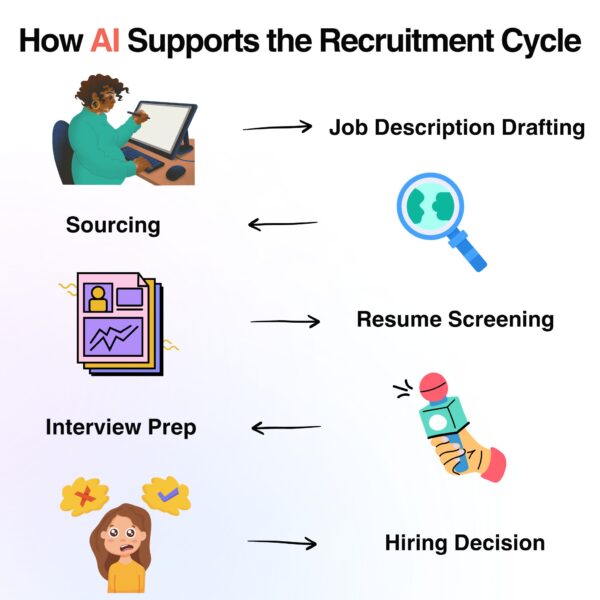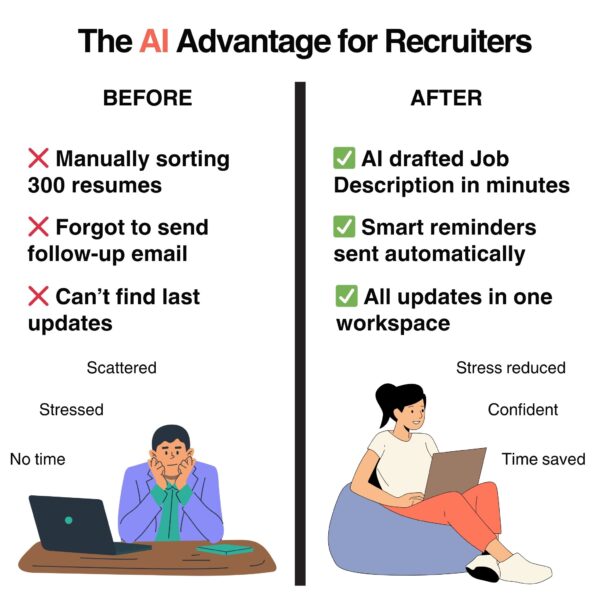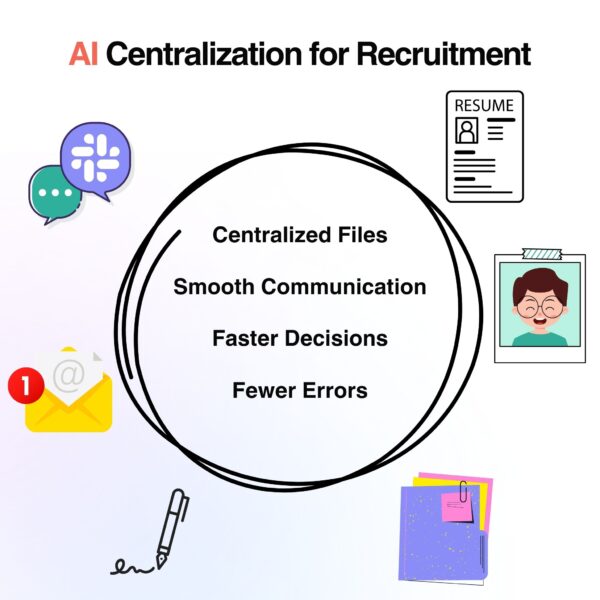Why AI for Recruitment Agencies is a Game-Changer
The world of recruitment has always been fast-paced, but in recent years, the demands on recruitment agencies have skyrocketed. Today’s agencies are expected to deliver top-tier talent faster than ever, all while juggling complex client needs, rising competition, and an overwhelming volume of candidate data. In this landscape, traditional methods just can’t keep up. Enter AI for recruitment agencies—not as a distant promise, but as a game-changing reality already reshaping the industry.
Adopting AI isn’t about replacing recruiters with robots. It’s about giving real people the tools they need to do their best work: automating tedious admin, surfacing hidden talent, and making data-driven decisions that lead to better hires. The agencies that get ahead in the next few years will be the ones that embrace AI as a strategic asset—transforming everything from candidate sourcing to client collaboration.
According to a 2024 BCG survey, a stunning 70% of companies experimenting with AI or GenAI are doing so within HR, with talent acquisition as the leading use case. This isn’t hype. It’s the new baseline for agencies that want to stay relevant, profitable, and trusted by clients.
10 Key Benefits
Let’s break down what makes AI for recruitment agencies so transformative—beyond the buzzwords. Here’s how AI is changing the game across the entire recruitment lifecycle, with real-world insights and practical value for agencies:

This diagram breaks down how AI tools streamline key tasks like resume screening, sourcing, and interview prep across the recruitment cycle.
1. Automating Repetitive Tasks
What it means:
AI takes over manual work like scheduling, resume parsing, and sending reminders—tasks that used to eat up hours of a recruiter’s week.
Why it matters:
This isn’t just about saving time. It’s about freeing recruiters to focus on building relationships, understanding client needs, and adding value where it counts.
Real-world insight:
Karla Thommen, managing director of people operations for The Partners Group, streamlined her work by using ChatGPT to draft a new job description. With just a few prompts, she had a 98% complete first draft within 20 minutes—a task that would have otherwise taken her several hours. Thommen’s team now uses GenAI tools not only for job descriptions, but also for tasks like writing performance plans, creating training content, generating interview questions, and even crafting staff recognition messages.
Benefit:
Free up your team’s time while improving operational efficiency.

2. Accelerated Candidate Sourcing
What it means:
AI scans huge databases, job boards, and social networks in seconds, surfacing qualified candidates you might otherwise miss.
Why it matters:
Recruiters can build richer pipelines and fill roles faster—crucial in today’s talent wars.
Real-world insight:
A global RPO and advisory firm, struggling to source enough quality candidates in a tight labor market, implemented Leoforce’s AI recruiting tool. By integrating Leoforce, the firm instantly accessed millions of profiles across 70+ platforms and leveraged multidimensional data to target more compatible candidates. As a result, their qualified candidate pipeline doubled, sourcing technology costs were cut by 50%, and candidate quality improved by 200%.
Benefit:
Build robust talent pipelines faster and improve time-to-hire.
3. Improved Resume Screening
What it means:
AI-powered screening tools parse resumes and applications, ranking candidates by fit, skills, and experience.
Why it matters:
This means no more slogging through hundreds of irrelevant resumes or missing out on hidden gems.
Real-world insight:
IBM’s Watson Recruitment boosted recruiter productivity by 50% and slashed time-to-fill by 93%.
Benefit:
Save time, reduce bias, and improve hiring accuracy.
4. Enhanced Candidate Engagement
What it means:
AI chatbots and automated messaging keep candidates in the loop, answer questions instantly, and book interviews—day or night.
Why it matters:
Great candidate experience leads to lower drop-off rates and a stronger agency reputation.
Real-world insight:
Hilton Worldwide implemented AI software that analyzed personal candidate information and related data, resulting in a 40% improvement in hiring rates. Most impressively, the time required to fill vacant positions was reduced by 90%.
Example 2: How AI Elevates Candidate Engagement
-
- AI-powered chatbots provide around-the-clock support and immediate responses, which helps keep candidates interested and reduces the likelihood that they’ll drop out of the process.
- Conversational interfaces make applying for jobs feel more like a dialogue than a chore, replacing intimidating, lengthy forms with interactive experiences.
- Automated messaging ensures candidates receive timely updates, so they always know where they stand and don’t feel left in the dark.
- AI solutions personalize the journey for each applicant, matching them with roles that fit their skills and preferences, leading to a better overall experience.
- Ultimately, by leveraging AI for candidate engagement, organizations can increase their hiring success rates and maintain strong connections with top talent at every stage of the recruitment process.
Benefit:
Improve response times while building a positive candidate experience. By using AI for Recruitment Agencies strategically, you can cut third parties from your hiring process and control all the information candidates will be exposed to.
5. Tailored Interview Preparation
What it means:
AI for Recruitment Agencies can generate job-specific interview questions, structure interview guides, and even score candidate responses for fairness and consistency.
Why it matters:
This ensures every candidate has an equal opportunity and gives clients reliable data to make informed hiring decisions.
Real-world insight:
Platforms like HireVue, commonly used in AI for Recruitment Agencies, personalize assessments based on the specific role. For example, a customer service applicant may be evaluated for empathy and communication, while a managerial candidate is assessed for leadership and problem-solving. These AI-driven interviews combine hard skills, soft skills, and behavioral assessments, all tailored to the job requirements.
Benefit:
Deliver structured, high-quality interviews that align with client expectations—another advantage of using AI for Recruitment Agencies.
6. Predictive Analytics for Better Hiring Decisions
What it means:
AI models analyze historical data to forecast which candidates are most likely to succeed and stay.
Why it matters:
This moves hiring from gut-feel to science, lowering turnover and boosting agency credibility.
Real-world insight:
HireVue’s AI goes beyond resumes, analyzing body language, eye movement, facial expressions, intonation, voice pitch, and “mood” to help spot high-potential hires.
Benefit:
Enhance hiring quality and deliver better-fit candidates to clients.
7. Centralized Collaboration
What it means:
AI platforms like Aurora bring all your candidate profiles, client communications, and internal team notes into a single, shared workspace for recruitment agencies.
Why it matters:
No more lost emails or scattered feedback—just smooth teamwork, clear handoffs, and faster placements.
Real-world insight:
Tools like Aurora stands out for its collaborative workspaces, where recruiting teams can manage projects, share client updates, and keep every detail organized in one place. By centralizing conversations, files, and workflows, agencies eliminate miscommunication and accelerate decision-making.
Check out more of Aurora Key Features here.
Benefit:
Eliminate bottlenecks and streamline your team’s productivity with true end-to-end collaboration—one of Aurora’s core strengths for recruitment agencies.

8. Scalable Operations
What it means:
AI allows agencies to handle more clients and roles—without burning out staff or sacrificing quality.
Why it matters:
You can grow your business without a linear increase in overhead.
Real-world insight:
Siemens cut technical role hiring time from 150 to 60 days using AI.
Benefit:
Scale operations effectively without increasing headcount.
9. Enhanced ROI
What it means:
AI reduces cost-per-hire, increases placement speed, and improves hiring quality—all of which boost profitability.
Why it matters:
Clients demand results, and with AI, you can deliver.
Real-world insight:
General Motors saved $2 million a year by automating hiring with AI.
Benefit:
Achieve up to a 30% reduction in cost-per-hire while maximizing profitability.
10. Tailored AI Tools Built for Agencies
What it means:
Not all AI is equal. The best platforms—like Aurora’s SmartFlows and Knowledge Docs—are built with agencies in mind, offering customizable workflows and seamless integration.
Why it matters:
You get tools that fit your process, not the other way around.
Real-world experience:
Agencies using Aurora report more organized operations, fewer errors, and better client/candidate experiences.
Benefit:
Save time, reduce errors, and enhance the overall recruitment experience. AI for Recruitment Agencies has never been more organized.
Get started with Aurora for free here.
In the recent video “Best AI Tools for Recruiters in 2025!”, recruiting experts Preston Park and team spotlight the AI solutions transforming recruitment agency workflows. They emphasize how tools like Juicebox, Clay, ChatGPT, Quill, and Handedly can dramatically improve sourcing, candidate engagement, and productivity for recruiters. For example, Juicebox is praised for its natural language search and candidate ranking, Clay excels at data enrichment and AI-driven research, while Quill is highlighted for its AI note-taking and ATS integration. The discussion underscores that integrating these AI platforms can “10x your recruiting” by automating busywork, boosting candidate quality, and freeing up recruiters for high-value relationship-building.
Comparison Table: Best AI Tools for Recruitment Agencies (2025)
| AI Tool | Key Features | Typical Use Case | Pricing Model |
|---|---|---|---|
| Aurora AI | SmartFlows, Knowledge Docs, automation, collaboration | End-to-end recruitment workflow, templates | Subscription |
| Juicebox | Natural language search, AI candidate ranking, outreach | Sourcing, ranking, and candidate outreach | Free/$79+/month |
| Clay | Data enrichment, multi-source research, AI agents | Company and candidate research, enrichment | Free/$134+/month |
| ChatGPT | Natural language AI, resume/JD analysis, messaging | Research, JD creation, messaging, review | Free/$20+/month |
| Quill | AI note-taking, ATS integration, candidate submissions | Call transcription, summaries, ATS | 14-day Free Trial |
| Handedly | Branded resumes, client portals, candidate submissions | Resume formatting, client presentation | Request demo |
| HireVue | Video interviewing, AI assessments, interview automation | Interview automation & screening | Per interview/seat |
| Paradox | AI chatbot, scheduling, candidate screening | Candidate engagement, screening automation | Subscription |
Note:
This table includes standout tools reviewed in the YouTube video as well as additional top-rated AI solutions for recruitment agencies, such as Aurora AI, HireVue, and Paradox, to give a more comprehensive view of the best options available in 2025.
Watch the full review here:
Conclusion: AI for Recruitment Agencies is the Future
AI for recruitment agencies is no longer a luxury—it’s a necessity for staying ahead in today’s fast-paced talent landscape. By leveraging advanced solutions like Aurora, recruitment agencies can scale their operations, streamline candidate sourcing, and deliver faster, higher-quality placements. From automating repetitive tasks to enhancing candidate experience and reducing hiring bias, AI for recruitment agencies empowers your team to focus on what matters most: building relationships and making the right hires.
For leaders in the recruitment sector, the message is clear: embracing AI for recruitment agencies isn’t just about efficiency—it’s about positioning your agency as an industry innovator, ready to compete for the best talent and deliver exceptional results.
Frequently Asked Questions (FAQs)
Q: Will AI for recruitment agencies replace recruiters?
A: No. AI for recruitment agencies is designed to support, not replace, human recruiters. These tools automate time-consuming tasks like screening and scheduling, so recruiters can focus on strategic work and relationship-building.
Q: Does AI for recruitment agencies remove bias from hiring?
A: AI can help reduce unconscious bias by standardizing the evaluation process and focusing on relevant skills and experience. However, it’s crucial that the AI is trained on fair, diverse data and regularly monitored by human experts.
Q: How do AI tools improve candidate experience in recruitment agencies?
A: AI for recruitment agencies uses chatbots and automation to keep candidates informed, answer questions promptly, and personalize communication—making the process smoother, faster, and more transparent.
Q: What’s the ROI of using AI for recruitment agencies?
A: The ROI for AI for recruitment agencies can be substantial. For example, General Motors saved $2 million by automating interview scheduling with conversational AI, resulting in faster hires and a better candidate experience.
Q: What’s the most important thing to remember when using AI for recruitment agencies?
A: Always keep the “human” touch. Use AI for recruitment agencies to enhance your workflow and decision-making, but remember that building connections and understanding people is at the heart of successful recruiting.
Q: Can AI for recruitment agencies help with document and presentation creation?
A: Yes! Solutions like Aurora Slides use AI to turn unstructured information—like meeting notes, call transcripts, and brainstorming sessions—into clear, visually compelling presentations in minutes. This helps recruitment agencies communicate more effectively with both clients and candidates.. Discover more about it in our Learning Vault.
Q: How does AI for recruitment agencies support team collaboration?
A: AI-powered tools allow recruitment teams to collaborate in real-time, organize feedback, share updates, and manage access with ease. For example, features like Aurora Slides provide centralized workspaces and permission controls so that both internal teams and clients can contribute and stay aligned throughout the hiring process.
